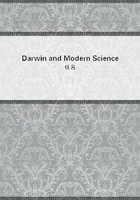
第53章
To us moderns the question at issue has a diminished significance. For over all such debates a change has been brought by Weismann's challenge for evidence that use and disuse have any transmitted effects at all. Hitherto the transmission of many acquired characteristics had seemed to most naturalists so obvious as not to call for demonstration. (W. Lawrence was one of the few who consistently maintained the contrary opinion. Prichard, who previously had expressed himself in the same sense, does not, I believe repeat these views in his later writings, and there are signs that he came to believe in the transmission of acquired habits. See Lawrence, "Lect.
Physiol." 1823, pages 436-437, 447 Prichard, Edin. Inaug. Disp. 1808 (not seen by me), quoted ibid. and "Nat. Hist. Man", 1843, pages 34 f.)Weismann's demand for facts in support of the main proposition revealed at once that none having real cogency could be produced. The time-honoured examples were easily shown to be capable of different explanations. A few certainly remain which cannot be so summarily dismissed, but--though it is manifestly impossible here to do justice to such a subject--I think no one will dispute that these residual and doubtful phenomena, whatever be their true nature, are not of a kind to help us much in the interpretation of any of those complex cases of adaptation which on the hypothesis of unguided Natural Selection are especially difficult to understand. Use and disuse were invoked expressly to help us over these hard places; but whatever changes can be induced in offspring by direct treatment of the parents, they are not of a kind to encourage hope of real assistance from that quarter. It is not to be denied that through the collapse of this second line of argument the Selection hypothesis has had to take an increased and perilous burden. Various ways of meeting the difficulty have been proposed, but these mostly resolve themselves into improbable attempts to expand or magnify the powers of Natural Selection.
Weismann's interpellation, though negative in purpose, has had a lasting and beneficial effect, for through his thorough demolition of the old loose and distracting notions of inherited experience, the ground has been cleared for the construction of a true knowledge of heredity based on experimental fact.
In another way he made a contribution of a more positive character, for his elaborate speculations as to the genetic meaning of cytological appearances have led to a minute investigation of the visible phenomena occurring in those divisions by which germ-cells arise. Though the particular views he advocated have very largely proved incompatible with the observed facts of heredity, yet we must acknowledge that it was chiefly through the stimulus of Weismann's ideas that those advances in cytology were made; and though the doctrine of the continuity of germ-plasm cannot be maintained in the form originally propounded, it is in the main true and illuminating. (It is interesting to see how nearly Butler was led by natural penetration, and from absolutely opposite conclusions, back to this underlying truth: "So that each ovum when impregnate should be considered not as descended from its ancestors, but as being a continuation of the personality of every ovum in the chain of its ancestry, which every ovum IT ACTUALLY IS quite as truly as the octogenarian IS the same identity with the ovum from which he has been developed. This process cannot stop short of the primordial cell, which again will probably turn out to be but a brief resting-place. We therefore prove each one of us to BE ACTUALLY the primordial cell which never died nor dies, but has differentiated itself into the life of the world, all living beings whatever, being one with it and members one of another," "Life and Habit", 1878, page 86.) Nevertheless in the present state of knowledge we are still as a rule quite unable to connect cytological appearances with any genetic consequence and save in one respect (obviously of extreme importance--to be spoken of later) the two sets of phenomena might, for all we can see, be entirely distinct.
I cannot avoid attaching importance to this want of connection between the nuclear phenomena and the features of bodily organisation. All attempts to investigate Heredity by cytological means lie under the disadvantage that it is the nuclear changes which can alone be effectively observed.
Important as they must surely be, I have never been persuaded that the rest of the cell counts for nothing. What we know of the behaviour and variability of chromosomes seems in my opinion quite incompatible with the belief that they alone govern form, and are the sole agents responsible in heredity. (This view is no doubt contrary to the received opinion. I am however interested to see it lately maintained by Driesch ("Science and Philosophy of the Organism", London, 1907, page 233), and from the recent observations of Godlewski it has received distinct experimental support.)If, then, progress was to be made in Genetics, work of a different kind was required. To learn the laws of Heredity and Variation there is no other way than that which Darwin himself followed, the direct examination of the phenomena. A beginning could be made by collecting fortuitous observations of this class, which have often thrown a suggestive light, but such evidence can be at best but superficial and some more penetrating instrument of research is required. This can only be provided by actual experiments in breeding.